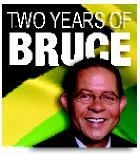Good moves, Bruce - Jamaicans commend Gov't for health care, free education policies
Published: Friday | September 4, 2009

It was not a bad idea after all. Well, that is on the matter of the Government abolishing the collection of user fees at public-health facilities and tuition fees in secondary schools.
However, Jamaicans are flashing the warning lights on another major government policy - the return to the International Monetary Fund (IMF).
The most recent Gleaner-commissioned Bill Johnson polls have found that a clear majority of Jamaicans believe the no-user-fee health policy and the abolition of school fees are good actions by the Government.
The polls found that a combined 62 per cent of respondents regarded the tuition-free policy as either good or very good. At the same time, 66 per cent of respondents said removing user fees for health care was at least good.
Johnson polled 1,008 respon-dents in August. His survey has a margin of error of plus or minus three per cent.
Since April 1 last year, patients at public hospitals and health centres, except the University of the West Indies, started to benefit from a number of health services free of cost. Health Minister Rudyard Spencer has said the policy has resulted in the saving of more than $1 billion by Jamaicans.
The no-fee policies in education and health, however, have not been without criticisms. The opposition People's National Party (PNP) has said that the quality of health care, for example, has been com-promised because the policy has not addressed fundamental areas such as access to drug and the provision of equipment for medical practitioners.
In education, school adminis-trators have said they are experiencing difficulties collecting auxiliary fees, which they say are essential to run the institutions. Administrators have said that the tuition fees, which are now paid by government, is not enough to run the programmes of schools.
President of the Jamaica Teachers' Association (JTA) Michael Stewart told The Gleaner that he hopes there will not be a correlation between the number of persons who regard the no-tuition fee policy as good and the willingness of parents to pay auxiliary fees.
"Schools are going to be experiencing greater challenges given the effects of the economic recession, but we hope that parents do their best to support their children's education," Stewart said.
Johnson's survey found that 24 per cent of Jamaicans believe tuition fee education to be at least bad while 22 per cent seem to hold the view that the abolition of user fees for health care should not have taken place.
Meanwhile, despite statements from Prime Minister Bruce Golding and Finance Minister Audley Shaw that Jamaica had no choice but to resume a borrowing relationship with the IMF, most Jamaica's want another option.
A sizeable 46 per cent of the respondents object to Jamaica participating in the loan programme with the IMF.
At the same time, 38 per cent of those surveyed have seemingly been convinced by Golding and Shaw. They said Jamaica should participate in the programme. The remaining 16 per cent of respondents are sitting on the fence.
Jamaica will be seeking to borrow US$1.2 billion from the IMF under a standby arrangement.








